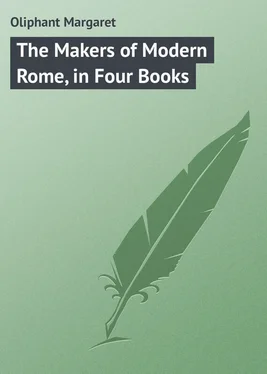Margaret Oliphant - The Makers of Modern Rome, in Four Books
Здесь есть возможность читать онлайн «Margaret Oliphant - The Makers of Modern Rome, in Four Books» — ознакомительный отрывок электронной книги совершенно бесплатно, а после прочтения отрывка купить полную версию. В некоторых случаях можно слушать аудио, скачать через торрент в формате fb2 и присутствует краткое содержание. Жанр: foreign_prose, на английском языке. Описание произведения, (предисловие) а так же отзывы посетителей доступны на портале библиотеки ЛибКат.
- Название:The Makers of Modern Rome, in Four Books
- Автор:
- Жанр:
- Год:неизвестен
- ISBN:нет данных
- Рейтинг книги:5 / 5. Голосов: 1
-
Избранное:Добавить в избранное
- Отзывы:
-
Ваша оценка:
- 100
- 1
- 2
- 3
- 4
- 5
The Makers of Modern Rome, in Four Books: краткое содержание, описание и аннотация
Предлагаем к чтению аннотацию, описание, краткое содержание или предисловие (зависит от того, что написал сам автор книги «The Makers of Modern Rome, in Four Books»). Если вы не нашли необходимую информацию о книге — напишите в комментариях, мы постараемся отыскать её.
The Makers of Modern Rome, in Four Books — читать онлайн ознакомительный отрывок
Ниже представлен текст книги, разбитый по страницам. Система сохранения места последней прочитанной страницы, позволяет с удобством читать онлайн бесплатно книгу «The Makers of Modern Rome, in Four Books», без необходимости каждый раз заново искать на чём Вы остановились. Поставьте закладку, и сможете в любой момент перейти на страницу, на которой закончили чтение.
Интервал:
Закладка:
The church in which Marcella and her young companion found shelter was the great basilica of St. Paul fuori le mura , beyond the Ostian gate. They were conducted there by their captors themselves, some compassionate Gaul or Frank, whose rude chivalry of soul had been touched by the spectacle of the aged lady's struggle for her child. What a terrible flight through the darkness must that have been "in the lost battle borne down by the flying" amid the trains of trembling fugitives all bent on that one spot of safety, the gloom lighted up by the gleams of the burning city behind, the air full of shrieks and cries of the helpless, the Tiber rushing swift and strong by the path to swallow any helpless wayfarer pushed aside by stronger fugitives. The two ladies reached half-dead the great church on the edge of the Campagna, the last refuge of the miserable, into which were crowded the wrecks of Roman society, both Pagan and Christian, patrician and slave, hustled together in the equality of doom. A few days after, in the church itself, or some of its dependencies, Marcella died. Her palace in ruins, her companions dead or fled, she perished along with the old Rome against whose vices she had protested, but which she had loved and would not abandon: whose poor she had fed with her substance, whose society she had attempted to purify, and in which she had led so honourable and noble – may we not also believe amid all her austerities, in the brown gown which was almost a scandal, and the meagre meals that scarcely kept body and soul together? – so happy a life. There is no trace now of the noble mansion which she devoted to so high a purpose, and few of the many pilgrims who love to discover all that is interesting in the relics of Rome, have even heard the name of Marcella – "Illam mitem, illam suavem, illam omni melle et dulcedine dulciorem" – whose example "lured to higher worlds and led the way." But her pleasant memory lingers on the leafy crest of the Aventine where she lived, and where the church of Sta. Sabina now stands: and her mild shadow lies on that great church outside the gates, often destroyed, often restored, the shrine of Paul the Apostle, where, wounded and broken, but always faithful to her trust, she died. The history of the first dedicated household, the first convent, the ecclesia domestica , which was so bright a centre of life in the old Rome, not yet entirely Christian, is thus rounded into a perfect record. It began in 380 or thereabouts, it ended in 410. Its story is but an obscure chapter in the troubled chronicles of the time; but there is none more spotless, and scarcely any so serenely radiant and bright.
Pammachius also died in the siege, whether among the defenders of the city or in the general carnage is not known, "with many other brothers and sisters whose death is announced to us" Jerome says, whom that dreadful news threw into a stupor of horror and misery, so that it was some time before he could understand the details or discover who was saved and who lost. The saved indeed were very few, and the losses many. Young Paula, the granddaughter of the first, the child of Toxotius, who also was happily dead before these horrors, had been for some years in Bethlehem peacefully learning how to take the elder Paula's place, and shedding sweetness into the life of the old prophet in his rocky chamber at Bethlehem, and of the grave Eustochium in her convent. Young Melania, standing in the same relationship to the heroine of that name, whose fame is less sweet, was out of harm's way too. They and many humbler members of the community had escaped by flight, among the agitated crowds which had long been pouring out of Italy towards the East, some from mere panic, some by the vows of self-dedication and retirement from the world. Many more as has been seen escaped in Rome itself, before its agony began, by the still more effectual way of death. Only Marcella, the first of all, the pupil of Athanasius, the mother and mistress of so many consecrated souls, fell on the outraged threshold of her own house, over which she had come and gone for thirty years, with those feet that are beautiful on the mountains, the feet of those who bring good tidings, and carry charity and loving kindness to every door.
BOOK II.
THE POPES WHO MADE THE PAPACY
CHAPTER I.
GREGORY THE GREAT
When Rome had fallen into the last depths of decadence, luxury, weakness, and vice, the time of fierce and fiery trial came. The great city lay like a helpless woman at the mercy of her foes – or rather at the mercy of every new invader who chose to sack her palaces and throw down her walls, without even the pretext of any quarrel against the too wealthy and luxurious city, which had been for her last period at least nobody's enemy but her own. Alaric, who, not content with the heaviest ransom, returned to rage through her streets with all those horrors and cruelties which no advance in civilisation has ever yet entirely dissociated from the terrible name of siege: Attila, whose fear of his predecessor's fate and the common report of murders and portents, St. Peter with a sword of flame guarding his city, and other signs calculated to melt the hearts of the very Huns in their bosoms, kept at a distance: passed by without harming the prostrate city. But Genseric and his Vandals were kept back by no such terrors. The ancient Rome, with all her magnificent relics of the imperial age, fell into ruin and was trampled under foot by victor after victor in the fierce license of barbarous triumph. Her secret stores of treasure, her gold and silver, her magnificent robes, her treasures of art fell, like her beautiful buildings, into the rude hands which respected nothing, neither beauty nor the traditions of a glorious past. How doth the city sit solitary that was full of people! All the pathetic and wonderful plaints of the Hebrew prophet over a still holier and more ancient place, trodden under foot and turned into a desert, rise to the mind during this passion and agony of imperial Rome. But the mistress of the world had no such fierce band of patriots to fight inch by inch for her holy places as had the old Jerusalem. There were few to shed their blood for her in the way of defence. The blood that flowed was that of murdered weakness, not that freely shed of valiant men.
During this terrible period of blood and outrage and passion and suffering, one institution alone stood firm amid the ruins, wringing even from the fiercest of the barbarians a certain homage, and establishing a sanctuary in the midst of sack and siege in which the miserable could find shelter. As every other public office and potency fell, the Church raised an undaunted front, and took the place at once of authority and of succour among the crushed and downtrodden people. It is common to speak of this as the beginning of that astute and politic wisdom of Rome which made the city in the middle ages almost a greater power than in her imperial days, and equally mistress of the world. But there is very little evidence that any great plan for the aggrandisement of the Church, or the establishment of her supremacy, had yet been formed, or that the early Popes had any larger purpose in their minds than to do their best in the position in which they stood, to avert disaster, to spread Christianity, and to shield as far as was possible the people committed to their care. No formal claim of supremacy over the rest of the Church had been as yet made: it was indeed formally repudiated by the great Gregory in the end of the sixth century as an unauthorised claim, attributed to the bishops of Rome only by their enemies, though still more indignantly to be denounced when put forth by any other ecclesiastical authority such as the patriarch of Constantinople. To Peter, he says in one of his epistles, was committed the charge of the whole Church, but his successors did not on that account call themselves rulers of the Church universal – how much less a bishropic of the East who had no such glorious antecedents!
Читать дальшеИнтервал:
Закладка:
Похожие книги на «The Makers of Modern Rome, in Four Books»
Представляем Вашему вниманию похожие книги на «The Makers of Modern Rome, in Four Books» списком для выбора. Мы отобрали схожую по названию и смыслу литературу в надежде предоставить читателям больше вариантов отыскать новые, интересные, ещё непрочитанные произведения.
Обсуждение, отзывы о книге «The Makers of Modern Rome, in Four Books» и просто собственные мнения читателей. Оставьте ваши комментарии, напишите, что Вы думаете о произведении, его смысле или главных героях. Укажите что конкретно понравилось, а что нет, и почему Вы так считаете.












